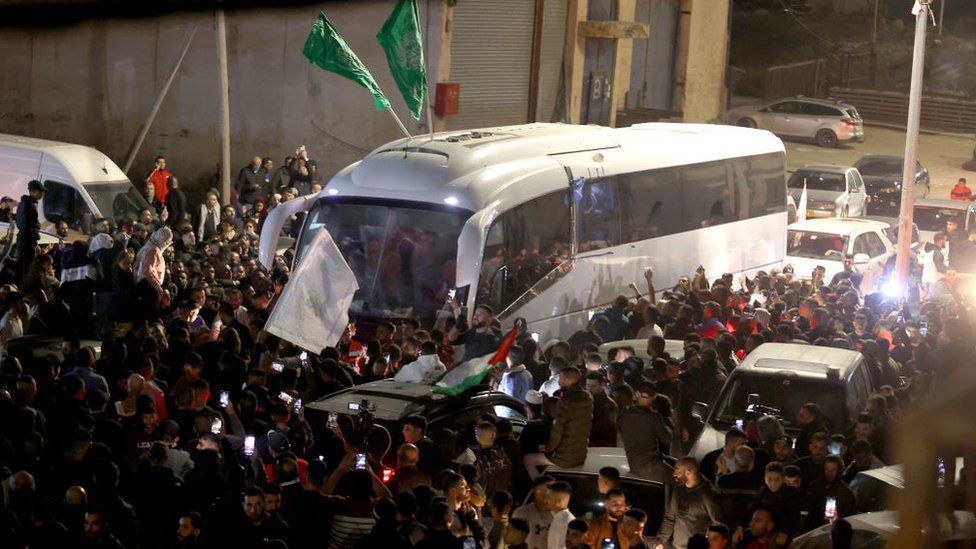Israel’s Palestinian prisoner release a ‘window of hope’ in West Bank
By nightfall, the road in front of the Beitunia checkpoint had the feel of a restive festival, the sting of politics and tear gas mingling in the air.
Small campfires flickered in front of a handful of green Hamas flags; there were many more Palestinian ones.
The return of 39 Palestinians from Israeli prisons to their homes in the occupied West Bank was never just going to be a family affair.
Israel’s jailing of large numbers of people on security grounds is widely seen by Palestinians as a tool of the occupation.
Charges range from murder and violent attacks on Israelis to stone-throwing. Many Palestinians say Israel is criminalising acts of resistance by an occupied people – the Israeli Prison Service (IPS) told the BBC all prisoners are detained “according to and under the provisions of the law”.
A quarter of the population of the West Bank has spent time in an Israeli jail; it is a shared experience.
And more than 3,000 people have been arrested since the 7 October attacks – including almost 900 children – according to the Palestinian Prisoners’ Club president, Abdallah Zughary. Many of these detainees have been placed in administrative detention without charge, he says.
“Most of them are civilians, not affiliated with any kind of political party or militant group,” Mr Zughary told me.
“Since 7 October, there have been no visits by families or lawyers to prisoners. And six prisoners have died.” He accuses Israel of using the justice system as a “revenge policy”.
A spokesperson for the IPS told the BBC that over the past few weeks, “four national security prisoners died” in different circumstances and on different days. “We have no knowledge of the causes of death,” they added.They refused to comment on the suggestion that families and lawyers had not been allowed to visit prisoners.
There is little faith here in Israel’s military courts, which are responsible for policing an occupied population, and which human rights groups have accused of handing down guilty verdicts to Palestinians 99% of the time.
The release of 39 women and teenagers is a tiny drop in the ocean of prisoners, but a massive symbol for Palestinians of their ability to – occasionally – force Israel’s hand.
Mustafa Barghouti, a senior Palestinian politician, told me that prisoners were a key part of the deal agreed between Israel and Hamas, and a key part of why that deal was good for Palestinians.
It should also be taken as a sign, he said, that a permanent ceasefire was possible, despite Israel’s insistence on resuming the war after the hostage deal has run its course.
“Israel has said many things before,” Dr Barghouti told me. “They said they would kill Hamas. Now they are negotiating with them.”
Israel has said its goals of eliminating Hamas and getting the hostages back are not in conflict, but some in its army worry that the deal could allow their enemy to regroup.
It has also strengthened the political standing of Hamas here in the West Bank – many of those gathered to wait for the returning prisoners at Beitunia checkpoint credited the group, though others stressed that this moment belonged to all Palestinians.
“We would like that this happened without the hostages taken by Hamas,” human rights lawyer Mohammed Khatib said. “But Israel doesn’t want [to do] this without paying the price. Without the Hamas hostages, Israel would not allow these people out.”
But, he said, it was also a “window of hope” for both Palestinians and Israelis.
“The end [goal] is that they must accept us as people, they must accept our right to exist.
“We are humans: we have names, families, lives. I see all of this in the eye of a child released from prison today.”
The return of prisoners here has been paved by a brutal attack, a devastating war and a hostage crisis.
“There’s a joy in this release but it is incomplete joy,” Abdallah Zughary told me, “because there’s a big price Palestinians have paid over past 45 days.”
Eman Barghouti, welcoming home her sister-in-law Hanan today, told me her family would not celebrate the release publicly, out of respect for Palestinians killed, injured and displaced by Israel’s bombardment of Gaza.
She said all the families she knew were doing the same.

But the crowds swarming around the prisoners’ bus as it crossed into Beitunia had no such reserve; a moment of happiness for prisoners’ families is also a moment of victory for Palestinians across the West Bank.
Behind the darkened windows, some of the prisoners could be seen dancing – one wrapped in a Palestinian flag.
To Israel the prisoners it released today are a security threat.
To the Palestinians gathered to greet them, they are victims of Israel’s occupation – and their release is symbolic of a wider goal.



